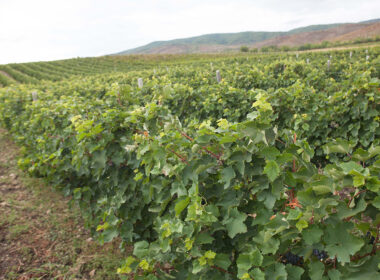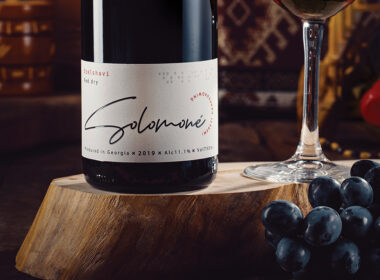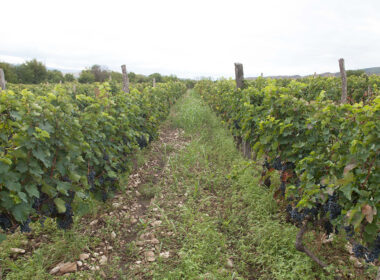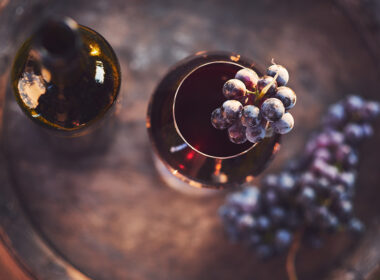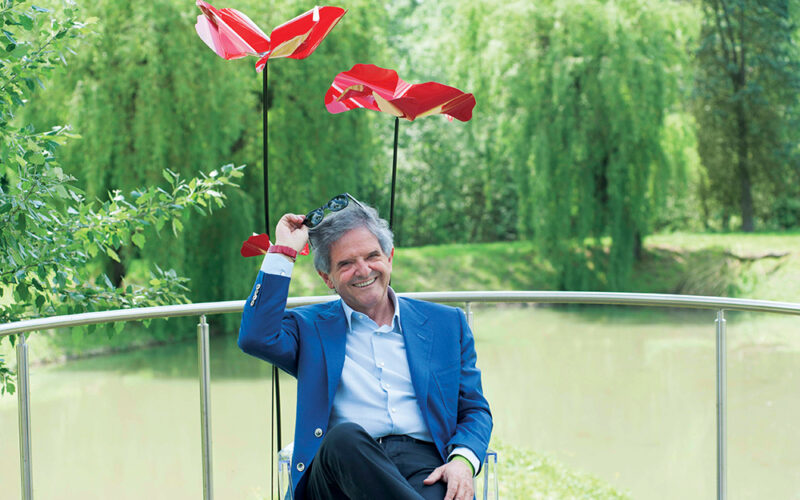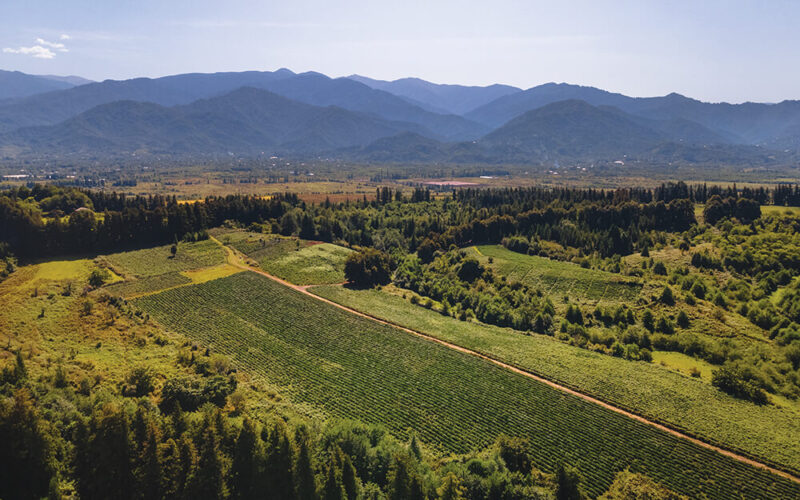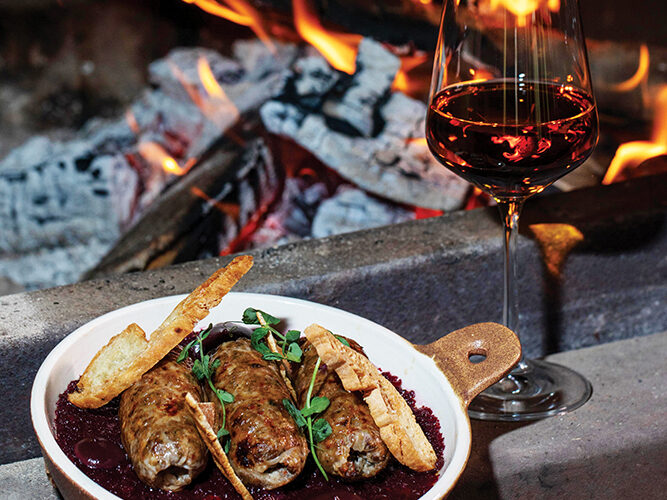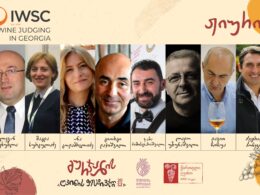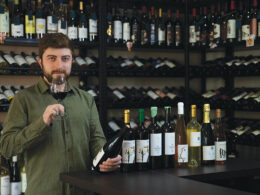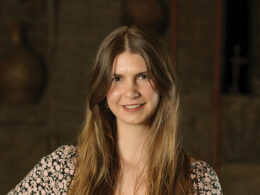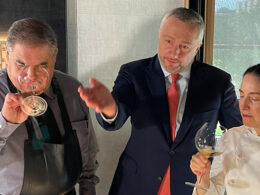| Homeland of Wine |
Since I was a child, I’ve been fascinated by clusters of grapes – their smooth, spherical geometry and velvety texture always captivated me. There was an ineffable quality about them that inspired me to devote myself to enology. Now, as I journey through life, I study the diverse grape varieties that I encounter along the way.
Donato Lanati completed his studies at the School of Enology in Alba before pursuing further education at the Faculty of Agricultural Sciences at the State University of Turin. Specialising in viticulture and winemaking, he aimed to acquire the title of enologist. Under the mentorship of the esteemed Professor Italo Einardi, Lanati delved into wine quality research. In 1982, he established his first laboratory, marking the beginning of his journey. By 1990, Lanati went on to establish Enosis Meraviglia.
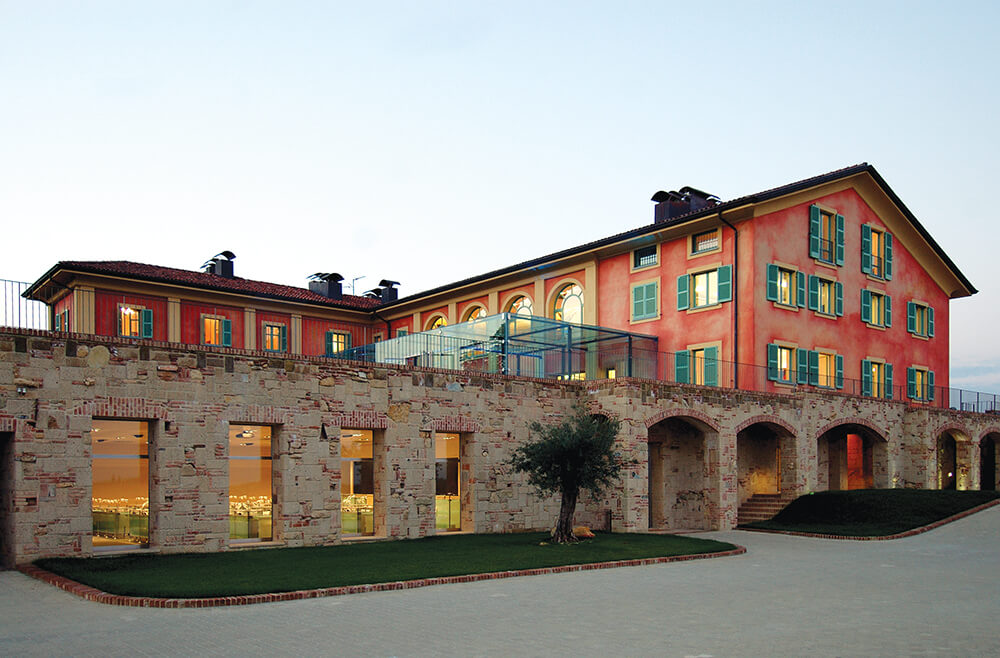
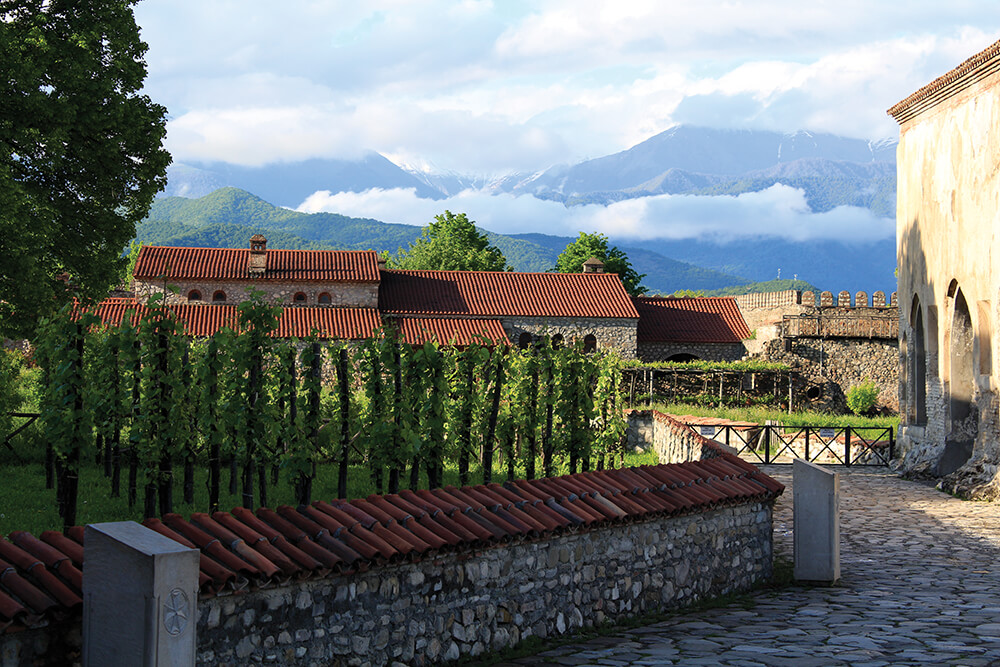
ALAVERDI MONASTERY
Research Centre- Enosis Meraviglia
Donato Lanati: Enosis, beyond its role as a significant research centre, embodies a methodology dedicated to crafting exceptional wines while enhancing the value of the specific vineyard sites, each of which is expressive of the wine’s distinct identity. Enosis comprises specialists who study the natural molecules that permeate wine with its quality. Our approach is underpinned by modern technologies and tools. In our research centre, we look for digital indicators that reveal enduring wine quality. When examining the wine’s colour, aroma, or taste, we focus on finding and identifying the relevant molecules. All our efforts are directed towards achieving results that satisfy both producers and consumers. We employ gas chromatography to analyse both grapes and wines, discerning their current aromas as well as those that will develop over time.
In our research centre, we explore all aspects of polyphenols to determine the most effective methods for wine fermentation, maceration, and ageing. We’re also investigating amino acids to better understand their impact on flavour depth, longevity, and their potential role in addressing challenges posed by climate change through proteins. Once we’ve received conclusive results, we’ll share this knowledge with enologists from various companies. Enosis Meraviglia represents years of accumulated experience and a vast database spanning almost 35 years.
Three constants for Dr. Lanati are: enology, the study of traditions, and innovation. For him, tradition isn’t static; rather, it’s the dynamic force that drives development and shapes the future.
He has a hobby which serves as a means to transform stress into relaxation, fueling him with positive energy and emotions while revelling in the exhilarating adrenaline rush. This hobby is off-road motorcycle riding. “Motocross and Enduro provide me with a sense of freedom, self-assurance, and the determination to persevere even in the face of daunting challenges, which are often encountered on the tracks of Maule in Bergamo, the heartland of Enduro.”
Q: Dr. Lanati, as a globally acclaimed enologist and one of the top winemakers as named by Wine Enthusiast, you’ve earned a wine Oscar. What significance do these accolades hold for you?
A: While it’s undoubtedly gratifying for us humans to be recognized and rewarded for our long-term work, the greatest value lies in our capacity to relay innovations to people, thereby broadening the scope of knowledge.
Q: How do you perceive Georgia, the homeland of wine, and how does it distinguish itself from other wine-producing countries?
A: Georgia stands out primarily due to its centuries-old culture deeply rooted in winemaking. Centuries ago, the Georgian people managed to transform vines into a significant source of wealth and treasure. Take a look at old Georgian icons or temple ornaments – vines, grape bunches, and leaves adorn them abundantly. This is what makes Georgian wine exceptional – featuring varieties unheard of in Europe and America, each with its distinct, special organoleptic qualities.
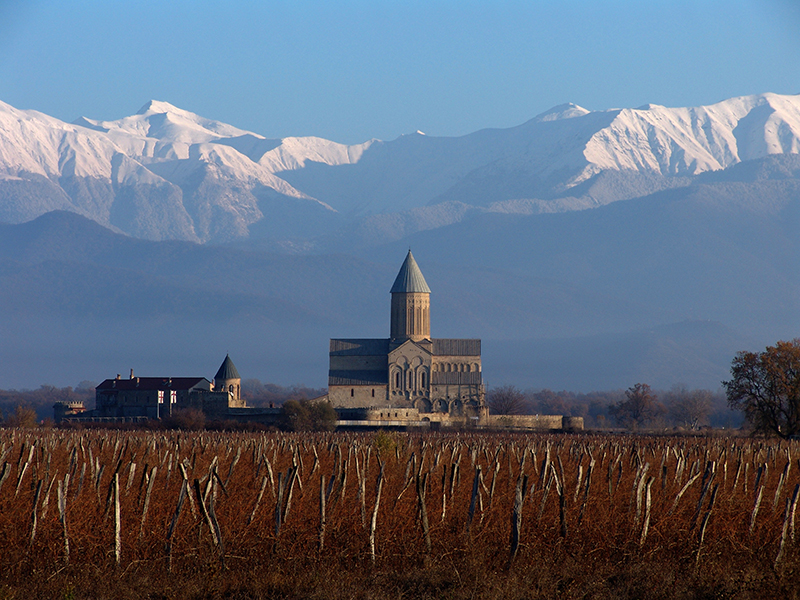
Working in the homeland of wine is, for me, a unique blend of emotion, motivation, and honour. It was in this country that I discovered the remarkable method of making wine in a qvevri. This technique represents a brilliant synthesis of tradition and a naturalistic approach – using only grapes without any other products or additives to produce wine.
Q: “Georgian Donato”, what would you say to this status?
A: When I first visited Georgia in 2006, it truly felt like a rebirth. The land and culture of this country immediately instilled a sense of peace and harmony within me. From the start, I made it my mission to understand the wisdom and teachings of the Georgian winemakers I encountered, devoting myself to studying Georgian grape varieties. At the time, there were only a few wine enterprises in the Kakheti region. Now, nearly 20 years later, numerous large, medium, and small producers are exporting 50% of their wine – a remarkable achievement for the entire region.
I am grateful to Georgia and Badagoni for acknowledging my efforts and hard work and honouring me with Georgian citizenship. I truly appreciate the nickname “Georgian Donato”. Some events leave an indelible mark on us, one such event for me was receiving Georgian citizenship, which evoked much deeper emotion in me than being granted honorary citizenship of Vogera (where I was born).
Salome Salakaia, winemaker at Badagoni, achieving her master’s degree from the University of Turin, where I also graduated, evokes profound emotions. The success of a Georgian female enologist holds immense significance for Georgia.
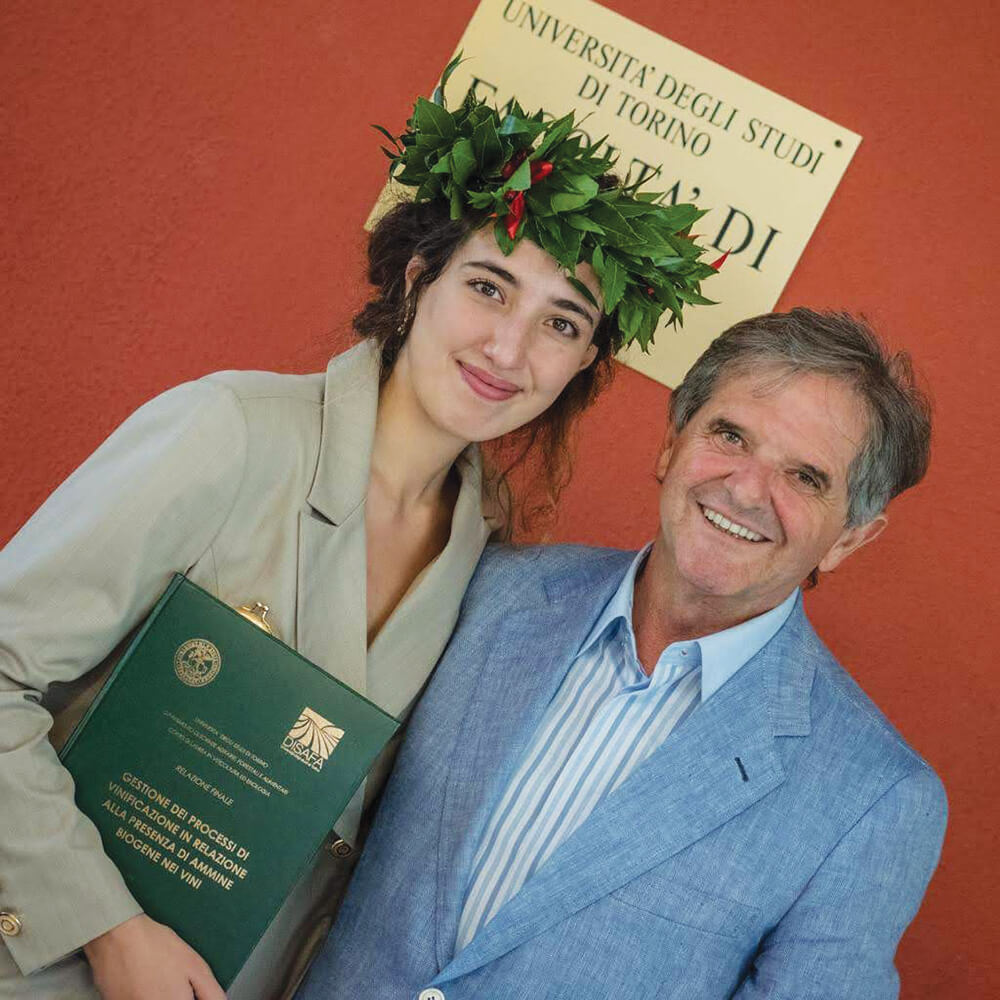
Salome Salakaia and Dr. Donato Lanati
Badagoni- A Tale of Never-Ending Success
A wine cellar project was meticulously planned and executed at Badagoni, considering every crucial detail. Personnel were trained, and a state-of-the-art laboratory was established for quality control, all with the aim of elevating the company to international standards.
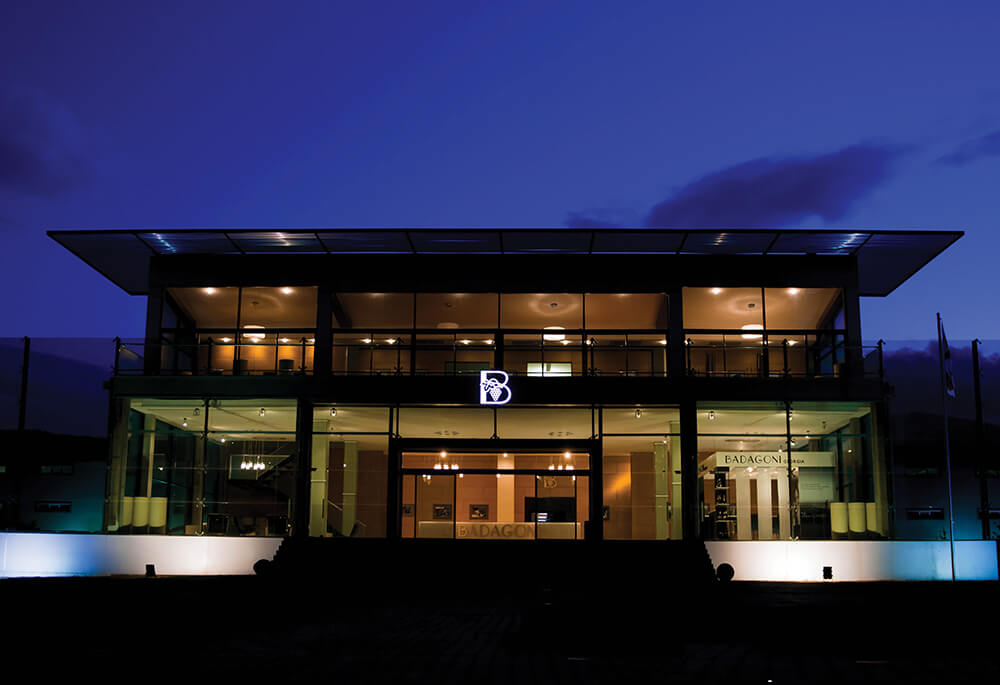
Wine is a team effort. You can’t do it alone. It requires teamwork between the vineyard, the cellar, and the laboratory to understand and enhance the connection between the soil and the grape variety. Badagoni recognized this and succeeded in achieving it. Coupled with high-quality wines, presented in beautifully labelled bottles, they’ve managed to astonish the world. Right from the start, at Badagoni, this was recognized as the path to success.
The formula of success for Badagoni is primarily attributed to Georgia, followed by the company’s team and all those who believe in Badagoni. It’s widely understood that people are the backbone of the company, propelling it forward and highlighting the country’s significance through the exceptional quality of its wine. One individual is Giorgi Salakaia, whose contributions have been instrumental to the brand’s success, both domestically and internationally. Above all, Giorgi is a dear friend to me. I attribute the impressive success of Badagoni to his extraordinary intuition. Today, with its blend of technology, innovation, and production, the company has the potential to rival the world’s best wine producers. Giorgi’s efforts have not only promoted Badagoni and Alaverdi, but have also elevated the profile of Georgian wine worldwide.
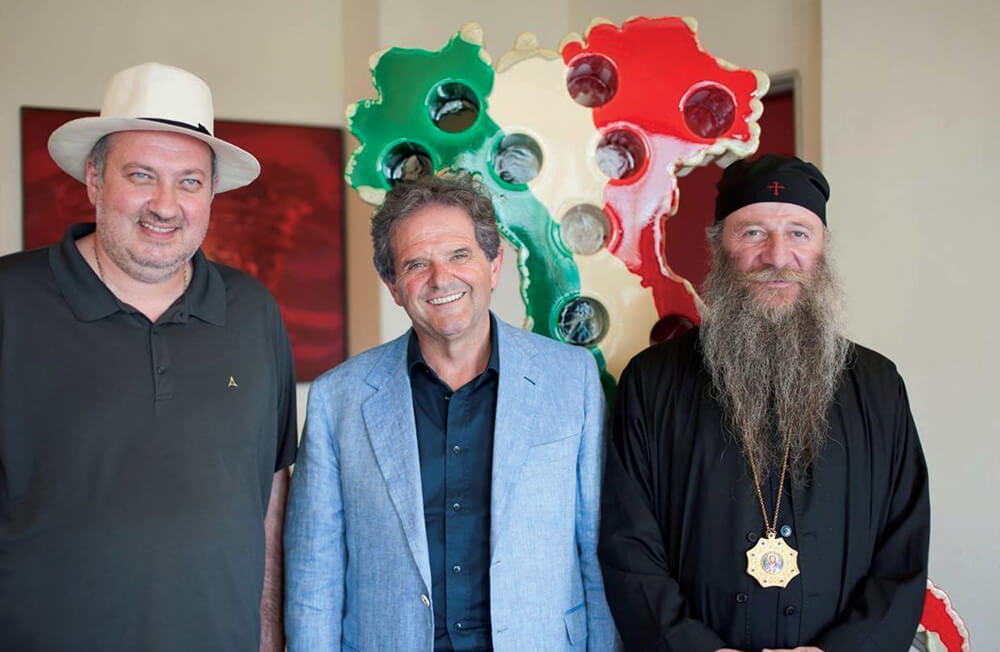
Giorgi Salakaia, Dr. Donato Lanati, Metropolitan David
This is the result of his entrepreneurial prowess and remarkable charisma. His foresight and talent for identifying what is valuable, significant, and beneficial, consistently influences those around him positively.
Georgian Grape Varieties: Their Uniqueness and Potential
Potential | Wine transcends the liquid in your glass. It embodies the power derived from a rich history: the love woven into it by the winemaker during its creation, the visionary approach of the winemaker, as well as the region, soil, and cellar. A creative individual has the ability to transform all these elements into an emotion.
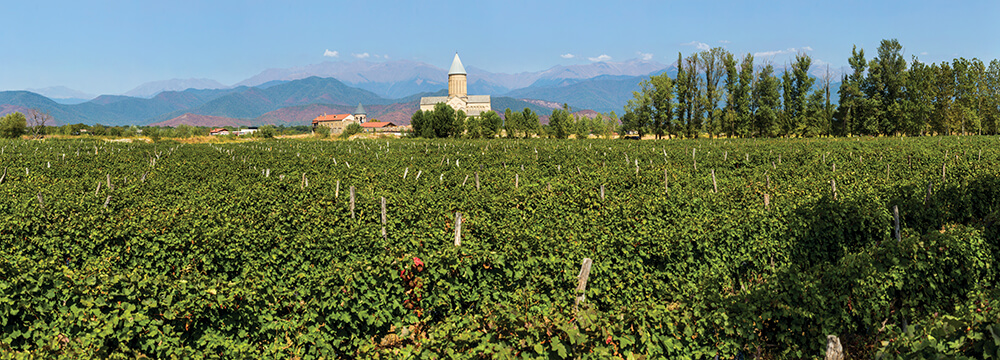
The essence of wine lies in its ability to evoke emotions, which stem not only from its colour, aroma, and taste, but also, fundamentally, from its history, the land, and the people who have nurtured the vine for centuries and brought it to this day. Wine, above all other beverages, has the unique ability to evoke these values from the very first sip. Georgian varieties stand out from others due to their robustness and structure. Their unique characteristics alone represent a special value that warrants attention in the global market.
Uniqueness | Georgia itself stands as unique, with its people, history, customs, and rich tapestry of traditions. The distinctiveness of Georgian wine stems from the brilliant fusion of vines and soil. These vines shouldn’t be distributed globally because this wine can only be crafted here, on this specific land.
Q: Despite the growing global interest in our wine culture, comprehensive knowledge about Georgia remains limited. Georgia is often left out of educational programs alongside other wine-producing nations. What are your thoughts on this?
A: Georgia is striving to secure a significant position among the globe’s wine-producing nations, a recognition it rightfully merits, due to its historical legacy and the remarkable commitment undertaken by the contemporary generation of Georgian winemakers. To climb the ranks, it’s crucial to promote history, sustainability, and good communication. Equally significant, is fostering strong ties between producers and the government to amplify the level of energy shared with the world.
Q: What was your experience like when you became interested in Georgian winemaking and began studying it extensively?
A: It was both fascinating and challenging. Despite Georgia’s status as the homeland of wine, with its rich history and culture spanning centuries, there’s a noticeable scarcity of international literature on its winemaking traditions. Exploring Georgian grape varieties felt like a journey into the roots of history. It was an honour, and a significant driving force. I had the opportunity to present my research paper at the XXXIII World Congress of Vine and Wine, 8th General Assembly of OIV, held in June 2010 in Tbilisi.
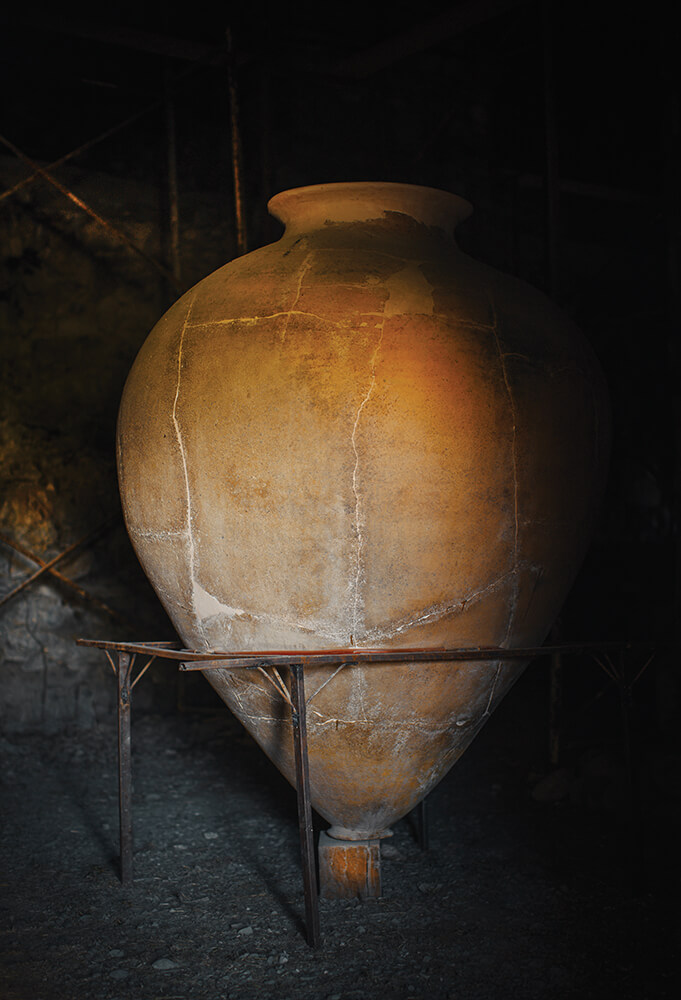
Q: How do you perceive qvevri wine: the symbol of Georgian identity?
A: The world of qvevri is a marvellous domain where tradition is upheld, highlighting the simplicity of winemaking with just grapes. I had the privilege of visiting the historic cellar of Alaverdi Monastery and observing the process of crafting wine in qvevri. This experience motivated me to delve deeper into the method, which I later discussed at the symposium. Alaverdi Monastery feels like stepping into a grand fairytale for me.
Metropolitan David possesses a remarkable gift – whenever he speaks, it’s as if he has a direct line to God. Within the walls of this monastery, I sensed a calling to safeguard and enhance the quality of wine. At first glance, crafting wine in a qvevri may appear straightforward—just place pressed grapes with stems and seeds into the vessel. However, the reality is far from simple. Numerous factors require attention, such as the temperature of the environment where the qvevri is buried, the material and shape of the vessel, and more. The intuition of the winemaker also significantly influences the process. These distinctions set the qvevri apart from a typical amphora. It’s evident that the qvevri holds a special place in Georgian identity.
Q: What Georgian wine do you find most remarkable?
A: With its intense ruby hue and captivating aromas of red fruit and spice, coupled with a long-lasting and harmonious flavour, tasting this wine feels like a stroke of luck, experiencing one of nature’s most beautifully balanced expressions—this is Saperavi. The Saperavi that stands out the most for me is the Badagoni Saperavi Reserve. Such an exceptional wine can only stem from grapes cultivated in the right soil, meticulous viticulture, and thoughtful enology.
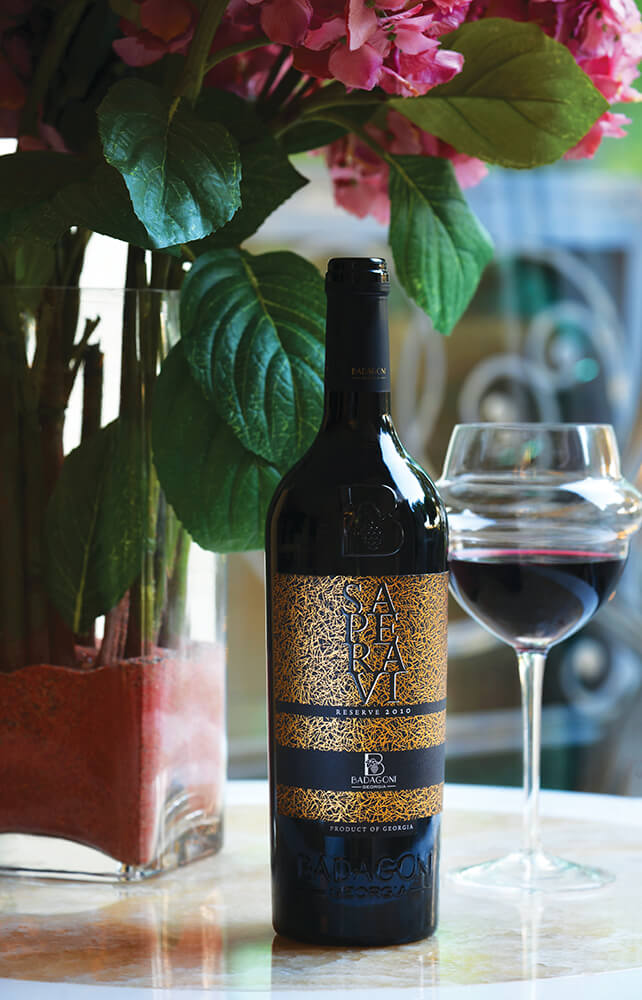
Saperavi stands as an ally to humanity, showcasing its remarkable ability to adapt to the passage of time, human influence, cultural shifts, and evolving lifestyles. It’s the hallmark of Badagoni and ranks among the world’s finest red wines, consistently emphasising its historical significance on the global wine scene.
Q: Dr. Lanati, we understand that you have a particular passion for the production of sparkling wines. Could you share what drives this passion? Also, is it accurate that the inspiration for creating a glass specifically tailored for sparkling wine originated from your experiences in Georgia?
I am deeply drawn to sparkling wine because its intricate production process transforms enology into an art form guided by science. Crafting sparkling wine requires meticulous adherence to a precise program, demanding the utmost knowledge and expertise—a culmination of centuries of visionary research.
It’s crucial to note that the cause of secondary fermentation remained a mystery until 1863, when Pasteur identified yeast as the agent responsible for alcoholic fermentation. Understanding the rich history of sparkling wine production is essential for achieving the best results. This history dates back to 1662 with the philosopher Saint Euremont and includes significant contributions from renowned figures such as Sir Kenelm Digby, Antoine de Muller, Maumene, Charmat, Carlo Gancia, Arnaldo Strucchi, Giovanni Borriero, and Cavalzani.
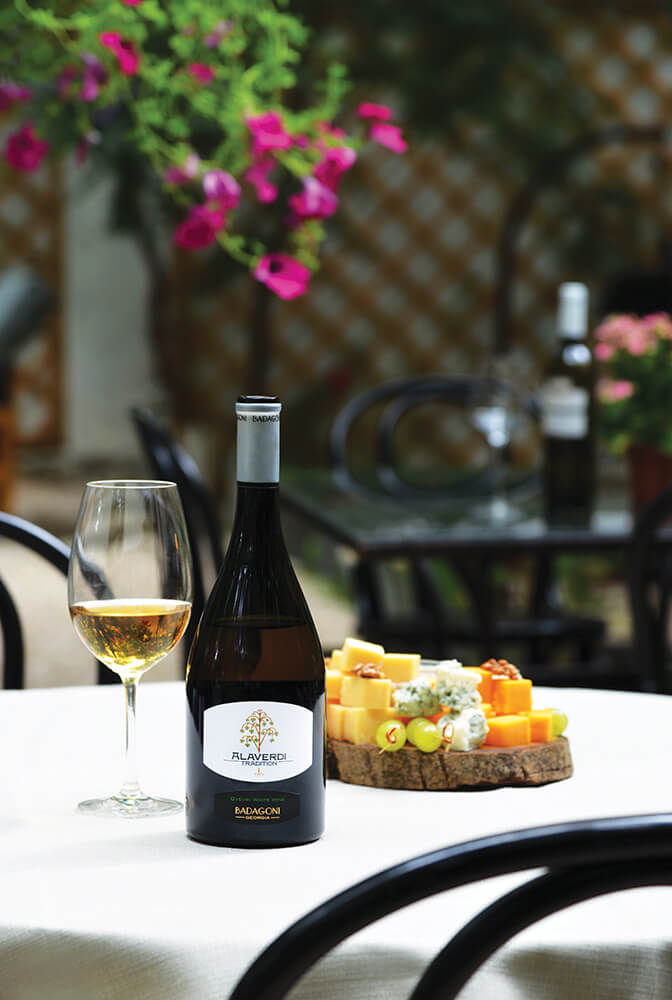
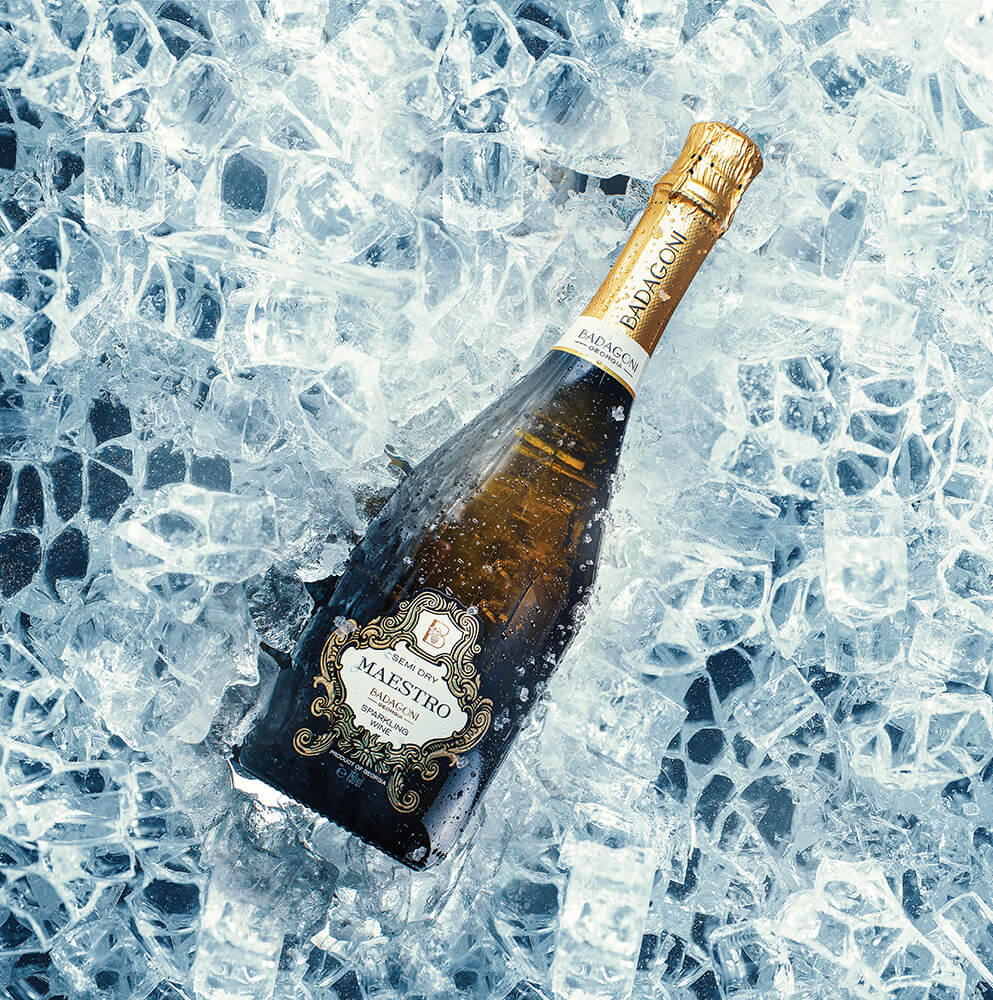
The most forward-thinking minds in winemaking were dedicated to refining the art of sparkling wine production. The inspiration behind the design of the sparkling wine glass has roots in Georgia. Sparkling wine epitomises celebration, joy, and happiness—emotions I’ve experienced and continue to feel every time I visit Georgia. The surroundings, the harmony of landscapes, and the hospitality of Georgians serve as my sources of inspiration. The creation of this glass shape was truly a moment of “Georgian elegance.”
Q: What is the wine of the future like?
A: People, such as yourself, who write about wine are more likely to have a better grasp of the right answer to this question. From my perspective, it is the faithful wine that never disappoints us and consistently delivers exceptional quality. Essentially, a good wine is one that compels us to repurchase, relish, and share it with others. It ignites our curiosity, prompting an exploration of its origins and delving into its backstory, understanding its essence.
დონატო ლანატი: ღვინო გუნდური თამაშია
ბავშვობიდან მიზიდავდა ყურძნის მტევნები – უკუთხო გეომეტრიული ფიგურები ხავერდოვანი ზედაპირით. იყო მათში რაღაც ისეთი, რამაც გადამაწყვეტინა, მთელი ცხოვრება ენოლოგიისთვის მიმეძღვნა. შემესწავლა ვაზის ჯიშები, რომლებსაც ცხოვრების გზაზე შევხვდებოდი.
დონატო ლანატიმ ენოლოგიის სკოლა ალბაში დაამთავრა, შემდეგ კი ტურინის სახელმწიფო უნივერსიტეტში სასოფლო-სამეურნეო მეცნიერების ფაკულტეტზე ჩააბარა. ენოლოგის წოდების მოსაპოვებლად სპეციალიზაცია მევენახეობა-მეღვინეობის მიმართულებით გაიარა. პროფესორმა, დიდმა ოსტატმა იტალო ეინარდიმ თავის შეგირდად აირჩია და ღვინის ხარისხის კვლევებში ჩართო. 1982 წელს, დონატო ლანატიმ თავისი პირველი ლაბორატორია შექმნა. 1990 წელს კი Enosis Meraviglia დააარსა.
კვლევითი ცენტრი Enosis Meraviglia
დონატო ლანატი: ენოსისი, მნიშვნელოვანი კვლევითია ცენტრია და ამავე დროს, სამუშაო მეთოდი, რომელიც მიზნად ისახავს ხარისხიანი ღვინოების წარმოებას და ღირებულების მინიჭებას იმ მიწისთვის, სადაც კონკრეტული ვენახია გაშენებული და რომელიც გამოხატავს კიდეც ღვინის იდენტობას.
Enosis-ის სპეციალისტები, სწავლობენ იმ ბუნებრივ მოლეკულებს, რომლებიც აცოცხლებენ ღვინის ხარისხს. ჩვენთან ყველაფერი თანამედროვე ტექნოლოგიებისა და ხელსაწყოების მეშვეობით მიმდინარეობს. კვლევით ცენტრში ვეძებთ ციფრულ ინდიკატორებს, რომლებიც მიგვითითებენ ღვინის საუკეთესო ხარისხზე გრძელვადიან პერსპექტივაში. ღვინის ფერის, არომატისა და გემოს შესასწავლად ვეძებთ და ვადგენთ შესაბამის მოლეკულებს. მთელი ჩვენი ძალისხმევა მიმართულია შედეგზე, რომლითაც მწარმოებელიცა და მომხმარებელიც აუცილებლად უნდა იყვნენ კმაყოფილი. ვიყენებთ გაზის ქრომატოგრაფიას როგორც ყურძნის, ისე ღვინოების შემთხვევაში, რათა განვსაზღვროთ მათში უკვე არსებული არომატები და ის არომატები, რომლებიც მომავალში გამოვლინდება.
კვლევით ცენტრში ვსწავლობთ პოლიფენოლების ასპექტებს, რათა დავადგინოთ ღვინის დუღილის, მაცერაციისა და დავარგების საუკეთესო მეთოდი. ვიკვლევთ ამინომჟავებს, იმისთვის, რომ გავიგოთ გემოს სიღრმე, ხანგრძლივობა და განვსაზღვროთ კლიმატის ცვლილების შედეგად გამოწვეული პრობლემების შეზღუდვის შესაძლებლობა ცილების საშუალებით. დაზუსტებული შედეგების მიღების შემდეგ კიჩვენ ცოდნას სხვადასხვა კომპანიის ენოლოგებს გადავცემთ. Enosis Meraviglia – ეს არის გამოცდილება და მონაცემთა ძალიან დიდი ბაზა, რომელიც თითქმის 35 წლის განმავლობაში დავაგროვეთ.
Q: ბატონო დონატო, თქვენ მსოფლიოში ცნობილი ენოლოგი ხართ. Wine Enthusiast-ის მიერ დასახელებული ხართ საუკეთესო მეღვინეთა შორის, გაქვთ ღვინის ოსკარი. რას ნიშნავს ეს აღიარებები თქვენთვის?
A: ადამიანები ყოველთვის ვამაყობთ, როდესაც ვიღებთ აღიარებასა და ჯილდოებს, როგორც ხანგრძლივი შრომის შედეგს. თუმცა ვფიქრობ, მთავარი ღირებულება მაინც ადამიანებისთვის ინოვაციების გადაცემის უნარი და ამით ცოდნის არეალის გაფართოებაა.
Q: როგორია თქვენი თვალით დანახული საქართველო – ღვინის სამშობლო და რით გამოირჩევა ის ღვინის მწარმოებელი სხვა ქვეყნებისგან?
A: საქართველოს, მეღვინეობასთან მრავალსაუკუნოვანი მჭიდროდ დაკავშირებული კულტურა გამოარჩევს. საუკუნეების წინ, ქართველმა ხალხმა მოახერხა და ვაზი მნიშვნელოვან სიმდიდრედ და საგანძურად აქცია. შეხედეთ ძველ ქართულ ხატებს, ანდა ორნამენტებს ტაძრებზე – ყველგან ვაზი, ყურძნის მტევნები და ფოთლებია გამოსახული. სწორედ ამიტომაა ქართული ღვინოც გამორჩეული – ევროპული და ამერიკული სამყაროსთვის უცნობი ჯიშებით და მათი უნიკალური, განსაკუთრებული ორგანოლეპტიკური მახასიათებლებით.
ჩემთვის ღვინის სამშობლოში მუშაობა ერთდროულად დიდი ემოციაც არის, სტიმულიც და პატივიც. სწორედ აქ გავეცანი ქვევრში ღვინის დაყენების საოცარ მეთოდს. ეს არის ტრადიციისა და ნატურალისტური კონცეფციის ბრწყინვალე სინთეზი – ღვინის დასაყენებლად საჭიროა მხოლოდ ყურძენი და არანაირი სხვა პროდუქტი ანდა დანამატი.
Q: „ქართველი დონატო“, რას იტყვით ამ სტატუსზე?
A: 2006 წელს პირველად ჩამოვედი საქართველოში და დამეუფლა შეგრძნება, რომ მეორედ დავიბადე. ამ მიწამ და ამ ქვეყნის კულტურამ პირველივე წუთიდან სიმშვიდე და საკუთარ თავთან ჰარმონია მაგრძნობინა. შევეცადე, კარგად გამეგო იმ ქართველი მეღვინეების გზავნილები თუ სწავლებები, რომლებსაც შევხვდი და მთელი ჩემი ძალისხმევაც ქართული ჯიშების შესწავლაში ჩავდე. კახეთის რეგიონში მაშინ ღვინის რამდენიმე საწარმო იყო. დღეს, თითქმის 20 წლის შემდეგ, უკვე არაერთი მსხვილი, საშუალო და მცირე მწარმოებელია, რომლებსაც ღვინის 50% ექსპორტზე გააქვთ. ეს მთელი რეგიონის წარმატებაა.
მადლიერი ვარ საქართველოსი და „ბადაგონის“, რომ აღიარეს ჩემი ძალისხმევა, შრომა და საქართველოს მოქალაქეობის მონიჭებით წამახალისეს. ძალიან მომწონს მეტსახელი “ქართველი დონატო”. არის მოვლენები, რომლებიც ჩვენზე წარუშლელ კვალს ტოვებს. ერთ-ერთი ასეთი სწორედ საქართველოს მოქალაქეობის მიღება იყო, დაკავშირებული ბევრად დიდ ემოციებთან, ვიდრე ვოგერას (სადაც დავიბადე) საპატიო მოქალაქეობის ტიტული.
დიდ ემოციებს უკავშირდება სალომე სალაყაიას მაგისტრის ხარისხის მოპოვებაც იმავე უნივერსიტეტში (ტურინი), რომელიც თავად დავამთავრე. ქართველი ქალი ენოლოგის – “ბადაგონის” მეღვინის ეს წარმატება ძალიან მნიშვნელოვანია საქართველოსთვის.
ბადაგონი – უწყვეტი წარმატების ისტორია
„ბადაგონში“ ყველა მნიშვნელოვანი დეტალის გათვალისწინებით დაიგეგმა და განხორციელდა ღვინის მარნის პროექტი. გადამზადდა პერსონალი. აშენდა თანამედროვე და უახლესი ტექნოლოგიით აღჭურვილი ლაბორატორია ხარისხის კონტროლისთვის. ეს ყველაფერი მიზნად ისახავდა კომპანიის საერთაშორისო დონეზე აყვანას.
ღვინო გუნდური თამაშია. მას მარტო ვერ გააკეთებ. საჭიროა თანამონაწილეობა ვენახს, მარანსა და ლაბორატორიას შორის, რათა შეეცადო, გაიგო და გააძლიერო კავშირი ნიადაგსა და ვაზს შორის. სწორედ ეს გააკეთა „ბადაგონმა“. დაუმატეთ ამას ულამაზესეტიკეტიან ბოთლებში ჩამოსხმული მაღალი ხარისხის ღვინოები და მიიღებთ შედეგს, რომლითაც შესაძლებელი გახდა მსოფლიოს გაოცება. „ბადაგონში“ თავიდანვე მიხვდნენ, რომ ეს იყო წარმატების გზა.
„ბადაგონის“ წარმატების ფორმულა უპირველეს ყოვლისა საქართველოს უკავშირდება, შემდეგ კი კომპანიის გუნდს და ყველა იმ ადამიანს, ვისაც სჯერა „ბადაგონის“. კომპანიას სწორედ ადამიანები ქმნიან და ღვინის მაღალი ხარისხის მეშვეობით წინ სწევენ და ხაზს უსვამენ ქვეყნის მნიშვნელობას. ერთ-ერთი ასეთი ადამიანი გიორგი სალაყაიაა, რომელსაც უკავშირდება კიდეც ამ ბრენდის წარმატების ისტორია როგორც საქართველოში, ისე მის ფარგლებს გარეთ. პირველ რიგში, გიორგი პირველ რიგში, ჩემი მეგობარია. ყოველთვის ვაღიარებ მის უტყუარ ინტუიციას „ბადაგონის“ დიდ წარმატებაში. ეს არის კომპანია, რომელიც დღეს, ტექნოლოგიებით, ინოვაციებითა და პროდუქციით, თავისუფლად შეიძლება მსოფლიოს საუკეთესო ღვინის მწარმოებელი კომპანიებისთვის შურის საგანიც კი გახდეს. გიორგიმ შეძლო, არა მხოლოდ „ბადაგონისა“ და ალავერდის, არამედ მთლიანად ქართული ღვინის პოპულარიზაცია მსოფლიოში, რაც მისი სამეწარმეო უნარებისა და დიდი ქარიზმის დამსახურებაა.
ქართული ვაზის ჯიშები: მათი უნიკალურობა და პოტენციალი
პოტენციალი: ღვინო არ არის უბრალოდ სითხე თქვენ ჭიქაში. ეს არის ძალა, რომელსაც ყოველთვის თან ახლავს დიდი ისტორია: სიყვარულის, რომელიც დამზადებისას მასში ჩააქსოვა მეღვინემ, ასევე რეგიონის, ნიადაგის, მარნის. შემოქმედებით ადამიანს ამ ყველაფრის ემოციად ქცევა ნამდვილად შეუძლია.
ღვინის ყველაზე მნიშვნელოვანი თვისება სწორედ ემოციების შექმნაა, რაც ეს დამოკიდებულია არა მხოლოდ მის ფერზე, არომატსა და გემოზე, არამედ უპირველესად მის ისტორიაზე, მიწაზე და ადამიანებზე, რომლებსაც სწამდათ ვაზის, საუკუნეების განმავლობაში უვლიდნენ მას და ასე მოიყვანეს დღემდე. ღვინოს, ნებისმიერ სხვა სასმელზე მეტად შეუძლია შეგაგრძნობინოთ ყველა ეს ღირებულება პირველივე ყლუპიდან.
ქართული ჯიშები სხვა ჯიშებისგან სიძლიერითა და სტრუქტურით გამოირჩევა. ფაქტი, რომ ისინი განსხვავებულია, უკვე წარმოადგენს განსაკუთრებულ ღირებულებას, რისი პოზიციონირებაც აუცილებლად უნდა მოხდეს მსოფლიო ბაზარზე.
უნიკალურობა: თავად საქართველოა უნიკალური ხალხით, ისტორიით, წეს-ჩვეულებებითა და მდიდარი ტრადიციებით. ქართული ღვინის უნიკალურობა კი ვაზისა და მიწის ბრწყინვალე კავშირიდან მომდინარეობს. არ შეიძლება ამ ვაზის გატანა მთელ მსოფლიოში, რადგან ამ ღვინის მიღება შესაძლებელია მხოლოდ აქ, ამ კონკრეტულ მიწაზე.
Q: არადა, მსოფლიო სულ უფრო მეტად ინტერესდება ჩვენი ღვინის კულტურით, თუმცა საქართველოზე სიღრმისეული ცოდნა ნაკლებია. ღვინის მწარმოებელ სხვა ქვეყნებთან ერთად, საქართველი არ არის შეტანილი სასწავლო პროგრამებში. რას ფიქრობთ ამასთან დაკავშირებით?
A: საქართველო ცდილობს მნიშვნელოვანი ადგილი დაიმკვიდროს ღვინის მწარმოებელ ქვეყნებს შორის და ამას იმსახურებს კიდეც როგორც ისტორიული მნიშვნელობით, ისე იმ დიდი პასუხისმგებლობით, რაც საქართველოს მეღვინეების თანამედროვე თაობამ იტვირთა. რეიტინგის სათავეში მოსახვედრად კი საჭიროა ისტორიისა და მდგრადი განვითარების პოპულარიზაცია, სწორი კომუნიკაცია. თუმცა არანაკლებ მნიშვნელოვანია კავშირები მწარმოებლებსა და მთავრობას შორის, რათა მსოფლიოსთვის ბევრად დიდი ენერგიის გადაცემა გახდეს შესაძლებელი.
Q: როგორი გამოცდილება იყო თქვენთვის ქართული მეღვინეობით დაინტერესება და მისი სიღრმისეული შესწავლა?
A: საინტერესო და ამავე დროს, ძალიან რთული, რადგან საერთაშორისო ლიტერატურაში მართლაც მწირია ინფორმაცია ქართული მეღვინეობის შესახებ. არადა, საქმე გვაქვს ღვინის სამშობლოსთან, მრავალსაუკუნოვანი ისტორიითა და კულტურით. ქართული ჯიშების შესწავლა ჩემთვის ისტორიის ფესვებში მოგზაურობას ჰგავდა. ეს იყო დიდი პატივიც და სტიმულიც. ჩემი ნაშრომი XXXIII ვენახისა და ღვინის მსოფლიო კონგრესზე, OIV-ს მე-8 გენერალურ ასამბლეაზე წარმოვადგინე, რომელიც თბილისში 2010 წლის ივნისში გაიმართა.
Q: როგორია თქვენი თვალით დანახული ქვევრის ღვინო, ქართული იდენტობის ნიშანი.
A: ქვევრი ის საოცარი სამყაროა, რომლის მეშვეობითაც ვინარჩუნებთ ტრადიციას და კონცეფციას, რომ ღვინის დასაყენებლად მხოლოდ ყურძენია საჭირო. გამიმართლა, რადგან მომეცა საშუალება, ალავერდის მონასტრის ისტორიულ მარანში ღვინის ქვევრში დაყენების პროცესისთვის მედევნებინა თვალი.
ალავერდის მონასტერი ჩემთვის ერთი დიდი ზღაპარივითაა. მეუფე დავითს ჯადოსნური უნარი აქვს – ყოველთვის, როცა საუბრობს, შეგრძნება მაქვს, რომ პირდაპირი კავშირი აქვს ღმერთთან. სწორედ აქ, ამ მონასტერში ვიგრძენი, რომ ღვინის ხარისხზე ზრუნვისა და მისი გაუმჯობესების მისია მაკისრია.
ქვევრში ღვინის დაყენება, ერთი შეხედვით, მარტივი საქმე ჩანს, რადგან საკმარისია, მასში მოვათავსოთ დაწურული ყურძენი კლერტითა და წიპწით. სინამდვილეში, საქმე არც ასე მარტივადაა. ყურადღება ბევრ რამეზეა გასამახვილებელი: ქვევრის მასალასა და ფორმაზე, მისი დარგვის ადგილის ტემპერატურაზე და სხვა. დიდი როლი აქვს მეღვინის ინტუიციასაც. ეს ყველაფერი ძალიან განასხვავებს ქვევრს ჩვეულებრივი ამფორასგან. მკაფიოა, რომ ქვევრი ქართული იდენტობის ნაწილია.
Q: რომელია თქვენთვის გამორჩეული, განსაკუთრებული ქართული ღვინო?
A: მკვეთრი ლალისფერი, წითელი ხილისა და სანელებლების მიმზიდველი არომატებით, ხანგრძლივი და დაბალანსებული გემოთი, რომელიც ნამდვილად გიტოვებთ შეგრძნებას, რომ ძალიან გაგიმართლათ, რადგან აგემოვნებთ ბუნების ერთ-ერთი უდიდეს და საოცრად დაბალანსებული გამოხატულებას. ეს საფერავია. ჩემთვის გამორჩეული საფერავი კი „ბადაგონის“ Saperavi Reserve-ა. ასეთი ბრწყინვალე ღვინო შეიძლება მხოლოდ სწორად შერჩეულ ნიადაგზე მოყვანილი ყურძნის, ფრთხილი და გააზრებული მევენახეობისა და გონიერი ენოლოგიის შედეგი იყოს.
საფერავი – ეს არის ადამიანის მოკავშირე ჯიში, რომელმაც კარგად დაგვნახა, რომ იცის, როგორ აუწყოს ფეხი დროს, ადამიანს, მის კულტურას და მისი ცხოვრების სტილის ცვლილებსაც კი.
საფერავი „ბადაგონის“ ნიშაა და მსოფლიოში ერთ-ერთი უდიდესი წითელი ღვინო, რომელიც ყოველთვის ადასტურებს თავის ისტორიულ მნიშვნელობას გლობალურ ასპარეზზე.
Q: ბატონო დონატო, ვიცით, რომ განსაკუთრებით ხართ გატაცებული ცქრიალა ღვინოების წარმოებით. რა არის ამის მიზეზი? და მართალია, რომ ცქრიალა ღვინისადმი მიძღვნილი ჭიქის შექმნის შთაგონება საქართველოში მოგივიდათ?
A: მიყვარს ცქრიალა ღვინო, რადგან სწორედ მისი დამზადების განსაკუთრებულმა პროცესმა მოგვცა საშუალება, აღგვექვა ენოლოგია როგორც ხელოვნება მეცნიერების ჭრილში. ცქრიალა ღვინის დასამზადებლად მნიშვნელოვანია, დიდი სიზუსტით მიჰყვეთ სპეციფიკურ პროგრამას, რომელიც მოიცავს უდიდეს ცოდნას და შორსმჭვრეტელი ადამიანების მიერ საუკუნეების განმავლობაში ჩატარებული კვლევების შედეგია.
ისიც უნდა ვიცოდეთ, რომ 1863 წლამდე არ იყო ცნობილი მეორადი დუღილის მიზეზი, ვიდრე პასტერმა არ აღმოაჩინა, რომ ალკოჰოლური დუღილის აგენტი საფუარი გახლდათ. საუკეთესო ცქრიალა ღვინის მისაღებად აუცილებელია, კარგად გავაცნობიეროთ ის ნაბიჯები, რომლებიც მისი ისტორიის გამავლობაში გადაიდგა, რომლებიც 1662 წელს, ფილოსოფოს სენტ ევრემონტთან იწყება, შემდეგ კი ისეთ ცნობილ პერსონაჟებზე გადადის, როგორებიც სერ კენელმ დიგბი, ანტუან დე მიულერი, მაუმენე, ჩარმატი, მარტინოტი, კარლო განსია, არნალდო სტრუჩი, ჯოვანი ბორიერო, მენსიო და კავალზანი არიან. მეღვინეობის ყველაზე შორსმჭვრეტელმა გონებამ სწორედ ცქრიალა ღვინოს მიუძღვნა თავი.
დიახ, ცქრიალა ღვინის ჭიქის ფორმის ინსპირაცია სწორედ საქართველოს უკავშირდება. ცქრიალა ღვინო ზეიმის, სიხარულის, სილაღის სინონიმია. ზუსტად ამას ვგრძნობდი და ვგრძნობ საქართველოში ყოველი ჩამოსვლისას. საგნების კონტურები, პეიზაჟების ჰარმონია, ქართველების სტუმართმოყვარეობა – აი, ჩემი შთაგონების წყარო. ჭიქის ეს ფორმა ეს მართლაც “ქართული სილაღის” მომენტი იყო.
Q: როგორია მომავლის ღვინო?
A: თქვენ, ვინც ღვინოზე წერთ, ალბათ უფრო უკეთ იცით ამ კითხვაზე პასუხი. ჩემი აზრით კი ეს არის გულწრფელი ღვინო, რომელიც არ გვიღალატებს და მუდამ იქნება ხარისხის გარანტი. კარგი ღვინო ხომ სწორედ ისაა, რომელიც აუცილებლად მოგვანდომებს, ხელახლა შევიძინოთ, დავაგემოვნოთ და გავუზიაროთ სხვებსაც. ასეთი ღვინო გვიღვიძებს ცნობისმოყვარეობას, სურვილს, მოვინახულოთ ის ადგილი, სადაც შეიქმნა, გავეცნოთ მის ისტორიას, იდენტობას.

